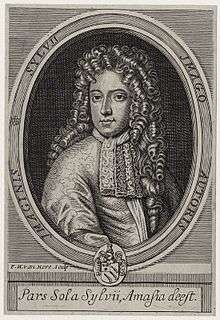John Hopkins (poet)
John Hopkins (born 1675) was an Anglo-Irish poet. He was the second son of Ezekiel Hopkins, bishop of Derry, and younger brother of Charles Hopkins.
John Hopkins | |
|---|---|
 John Hopkins, contemporary engraving by Frederick Hendrik van Hove. The inscription includes his pseudonym Sylvius. | |
| Born | 1675 |
| Alma mater | Jesus College, Cambridge |
| Genre | Poetry |
Life
He was born on 1 January 1675. John Hopkins graduated B.A. in 1693, and proceeded M.A. in 1698 from Jesus College, Cambridge.[1]
Works
Hopkins published in 1698 two Pindaric poems:
- The Triumphs of Peace, or the Glories of Nassau … written at the time of his Grace the Duke of Ormond's entrance into Dublin; and
- The Victory of Death; or the Fall of Beauty, on the death of Lady Cutts (Elizabeth, second wife of John Cutts, 1st Baron Cutts).[1]
In the following year he issued Milton's Paradise Lost imitated in Rhyme. In the Fourth, Sixth, and Ninth Books: Containing the Primitive Loves. The Battel of the Angels. The Fall of Man. His final work was a collection of love-verses and translations from Ovid, Amasia, or the Works of the Muses … In three volumes, 1700, with a general dedication to Isabella FitzRoy, Duchess of Grafton, and dedications of particular sections to various persons of distinction.[1]
There is a derisive notice on Hopkins in A Session of the Poets, 1704–5.[1]
References
- Attribution
![]()